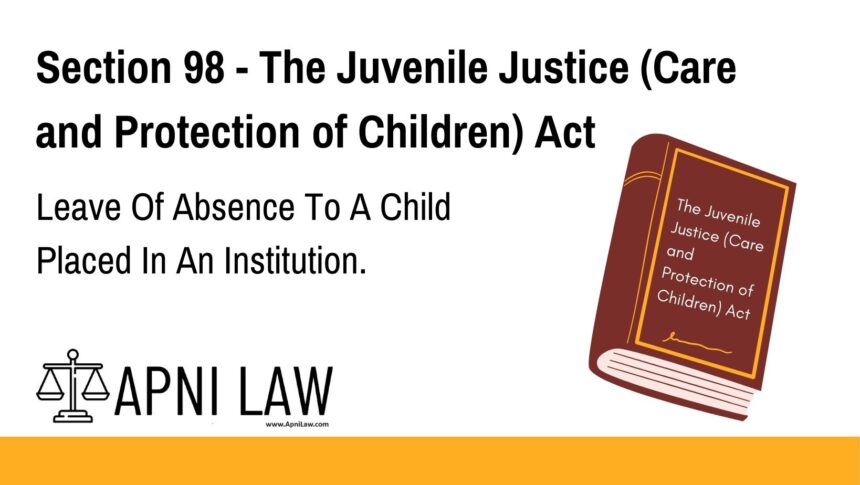Code: Section 98 of the Juvenile Justice (Care and Protection of Children) Act, 2015
(1) The Committee or the Board, as the case may be, may permit leave of absence to any child, to allow him, on special occasions like examination, marriage of relatives, death of kith or kin or accident or serious illness of parent or any emergency of like nature, under supervision, for a period generally not exceeding seven days in one instance, excluding the time taken in journey.
(2) The time during which a child is absent from an institution where he is placed, in pursuance of such permission granted under this section, shall be deemed to be part of the time for which he is liable to be kept in the Children’s Home or special home.
(3) If a child refuses, or has failed to return to the Children’s Home or special home, as the case may be, on the leave period being exhausted or permission being revoked or forfeited, the Board or Committee may, if necessary, cause him to be taken charge of and to be taken back to the concerned home:
Provided that when a child in conflict with law has failed to return to the special home on the leave period being exhausted or on permission being revoked or forfeited, the time for which he is still liable to be kept in the institution shall be extended by the Board for a period equivalent to the time which lapses due to such failure.
—
Explanation of Section 98 JJ Act
Section 98 of the Juvenile Justice Act allows a child placed in a Children’s Home or Special Home to take a temporary leave of absence. The Board or Committee may approve such leave for special occasions like school exams, a family wedding, or a parent’s serious illness. This leave usually lasts no more than seven days per occasion and does not include travel time.
If the child returns as scheduled, the leave period is counted as part of their total institutional stay. However, if the child fails to return or violates the terms, they can be taken back to the institution. In cases involving children in conflict with the law, the Board may also extend the stay duration to compensate for the time lost.
—
Key Features
- The Board or Committee may grant short-term leave for emergencies or significant family events.
- The child remains under supervision during the leave period.
- The time on leave counts as part of the institutional sentence.
- If a child does not return, authorities can order the child to be brought back.
- For children in conflict with law, a missed return may result in an extended stay.
—
Illustration
Example 1: Leave for a Family Emergency
A 15-year-old boy residing in a Special Home is granted leave to attend his father’s funeral. He returns within the approved seven-day period. The leave days are added to his institutional stay, meaning his release date remains unchanged.
Example 2: Failure to Return from Leave
A girl placed in a Children’s Home is allowed leave to attend her sister’s wedding. However, she does not return on time. The Committee arranges for her to be brought back. Since she is a child in conflict with law, the Board extends her stay by the number of days she overstayed her leave.
—
Common Questions and Answers
1. Who can approve a child’s leave of absence?
The Juvenile Justice Board or Child Welfare Committee, depending on the child’s case, can approve the leave.
2. How long can a child be on leave?
Generally, the maximum is seven days per occasion, not including travel time.
3. Does leave affect the child’s time in the institution?
No. The leave days are included in the total time the child is supposed to stay in the institution.
4. What if the child doesn’t return on time?
If a child overstays their leave or refuses to return, they can be taken back to the institution by order of the Committee or Board.
5. Can the child’s stay be extended for missing return deadlines?
Yes. For children in conflict with law, the Board may extend their stay by the number of days they overstayed their leave.
—
Conclusion
Section 98 of the Juvenile Justice Act balances the need for institutional care with the emotional and personal needs of children. By allowing temporary, supervised leave, it provides children with an opportunity to stay connected with their families during important life events. However, it also holds them accountable for returning on time and includes provisions for extending stays in case of non-compliance.
For more updates and expert insights on child protection law, visit ApniLaw.








